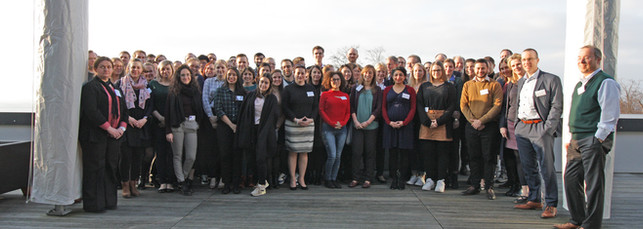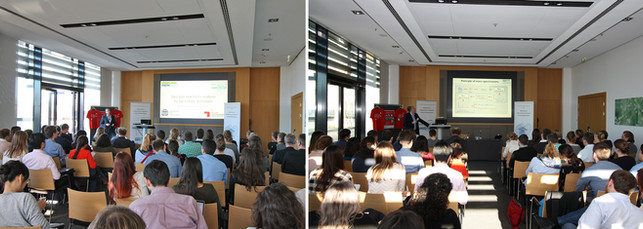
Dr. Heidi Noels and Dr. Yvonne Döring receive the W.H. Hauss Award from the DGAF
19-21 April 2018
Dr. Heidi Noels from the Institute for Molecular Cardiovascular Research at RWTH Aachen University together with Dr. Yvonne Döring from the Institute for Prophylaxis and Epidemiology of Circulatory Diseases at LMU Munich together received the DGAF W.H. Hauss Award 2018 from the German Society for Atherosclerosis Research (DGAF) during the 32nd Annual Meeting of the DGAF in Rauischholzhausen, Germany. They were awarded for their publication "Vascular CXCR4 Limits Atherosclerosis by Maintaining Arterial Integrity: Evidence From Mouse and Human Studies." (Circulation. 2017; 136: 388-403). In this work it could be shown that vascular CXCR4 has an atheroprotective function by maintaining the arterial integrity and preserving the endothelial barrier function. In addition, CXCR4 stabilizes a contractile smooth muscle cell phenotype. Targeted enhancement of these CXCR4-mediated protective functions could open up novel therapeutic options in the treatment of atherosclerosis.
The award was sponsored by a long-standing active member of the DGAF, Prof. Dr. Winfried März.
Project area Z
Administrative project
Robert Werner Mertens
MD student
University Hospital RWTH Aachen
Department of Internal Medicine
Project: The role of incretin hormone GLP-2 in septic cardiomyopathy
PI: Michael Lehrke
Robert Werner Mertens
MD student
University Hospital RWTH Aachen
Department of Internal Medicine
Project: The role of incretin hormone GLP-2 in septic cardiomyopathy
PI: Michael Lehrke
Consortium


Mechanisms of Cardiovascular Complications
in Chronic Kidney Disease
The SFB/TRR219 is supported by the German Research Foundation (DFG)
Project-ID 322900939
What we accomplished so far at TRR219 regarding RDM (#8)
This letter guides readers through latest developments in Research Data Management (RDM) at SFB/TRR219, including updates on Data Management Plans, the implementation of eLabJournal, and upcoming events. It also highlights our ongoing efforts to improve RDM practices and foster collaboration across the consortium.

Introduction
Research Data Management (RDM) is very important to us at SFB/TRR219. Our journey began by developing Data Management Plans (DMPs) for each group in the consortium. We then adopted ELabJournal as the Electronic Lab Notebook (ELN) for the UKA section of our team. Each month , we share a newsletter to cover important RDM topics. Additionally, all postdocs and PhD studens are required to complete the RDM Moodle course to gain a solid understanding of the key concepts and methods. We have also organized several events tailored specifically to the needs of SFB/TRR219, including the Coscine presentation and the upcoming "RDM in DFG Applications" workshop scheduled for September. Let's dive into more detail below.
Data Management Plans (DMPs)
A Data Management Plan (DMP) serves as a vital tool to document and maintain all essential information related to research data. Crafting a DMP can be a complex process, as it involves addressing multiple aspects of the data - from its type and storage location to access permissions and personal data considerations.
To streamline this process, we developed a custom made generic template "Life Sciences", that SFB/TRR219 can use. It aimes at reducing the workload by simpflifying the required questions. The DMPs are now complete, and we are preparing to update them for the third funding period.
ELabJournal
In May 2023, we introduced eLabJournal, an electronic lab notebook (ELN), to replace the traditional pen-and-paper method of notekeeping. This browser-based tool stores research data directly linked to experiments, allowing for project-focused documentation. His collaborative system allows multiple scientists to work together on projects, ensuring cohesive record-keeping across teams. While the ELN is primarily used by RWTH Aachen University-based projects, external partners and SFB/TRR219 members can be integrated as guest users.
To support users, we held several SFB user meetings to address challenges related to ELN usage and management. These meetings attracted researchers across various disciplines, helping them optimize their use of the ELN.
RDM Newsletter
In January 2024, we launched a monthly RDM newsletter, which is distributed to all SFB/TRR219 members. This newsletter invites our community to reflect on how best to organize and structure research data, while also providing updates on current RDM activities.
So far, we've explored topics such as:
1) Naming and Structure of the Reserach Data
2) Version Control: Strategies, Tools, and Best Practices
3) Password Protocol: Ensuring Digital Security
4) Johnny.Decimal - a system to organize your life
We are always open to suggestions for future topics. If there's anything you'd like us to cover, please feel free to reach out.
RDM Events for SFB/TRR219
We're organized several RDM events specifically for SFB/TRR219, including a presentation on Coscine, titled "Solutions for Research Data Storage According to the FAIR Principles," and the upcoming "RDM in DFG Applications" workshop in September.
Coscine Presentation: This session highlighted how Coscine can enhance research data management, improving the quality and impact of our work.
RDM in DFG Applications Workshop: This hybrid workshop will take place on 16.08.2024. It will provide essential insights and practical guidance on incorporating RDM into project proposals. Attendees will have the opportunity to ask questions and address any concerns for a more comprehensive understanding.
Additionally, some notable events have taken place:
Annual SFB Meeting 2024: During this meeting, we held an RDM workshop titled “Research Data Management on Practical Level: How to Achieve Transparent Data Description and Storage?”. This workshop fostered a bottom-up discussion focused on improving RDM practices at the lab level, encouraging practical solutions directly from the researchers themselves.
RDM Workshops (Late 2023): Last year, consortium members participated in key RDM workshops, including:
-
"Guidelines to RDM According to the FAIR Principle"
-
"Automating (Meta)Data Transfer to Coscine"
-
"Metadata Basics and Creating Application Profiles for Coscine"
These workshops were instrumental in enhancing our collective knowledge and application of RDM principles.
Brainstorm Meeting: Towards Integration of Tick@Lab and ELN: A recent brainstorming session explored the integration of our Electronic Lab Notebook (ELN) with the animal documentation program, Tick@Lab. This effort aims to streamline data collection and documentation processes across research and animal studies, further enhancing transparency and efficiency.
Bi-Weekly Consultation Hour: In addition, we offer a bi-weekly consultation hour dedicated to addressing any RDM-related questions or concerns. These sessions are a great opportunity for members to receive personalized support on any aspect of data management, from creating DMPs to optimizing the use of ELN and Coscine.
Disclaimer
I hope this was an interesting read. If you have comments, remarks, or suggestions about other RDM-related topics for the next newsletters, please let me know by sending me an email at dukkart@itc.rwth-aachen.de.
Image designed by freepik











